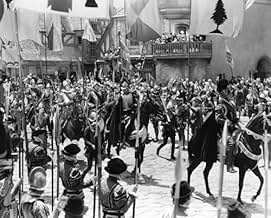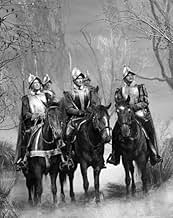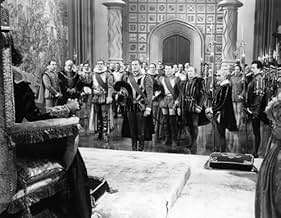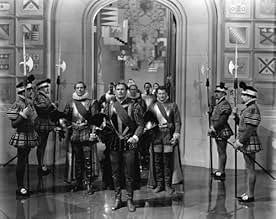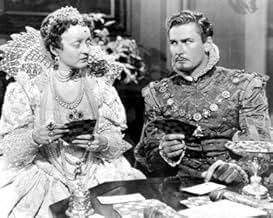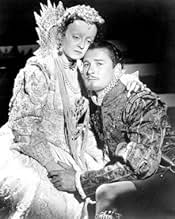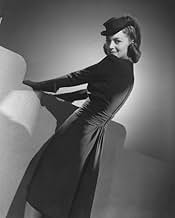La vie privée d'Elisabeth d'Angleterre
- 1939
- Tous publics
- 1h 46m
A depiction of the love/hate relationship between Queen Elizabeth I and Robert Devereux, the Earl of Essex.A depiction of the love/hate relationship between Queen Elizabeth I and Robert Devereux, the Earl of Essex.A depiction of the love/hate relationship between Queen Elizabeth I and Robert Devereux, the Earl of Essex.
- Director
- Writers
- Stars
- Nominated for 5 Oscars
- 3 wins & 5 nominations total
- Mistress Margaret Radcliffe
- (as Nanette Fabares)
- Lord Charles Howard
- (uncredited)
- Bit Part
- (uncredited)
- Majordomo
- (uncredited)
- Handmaiden
- (uncredited)
- Director
- Writers
- All cast & crew
- Production, box office & more at IMDbPro
Featured reviews
Bette made no secret of her dislike for the freewheeling, womanizing, undisciplined Flynn, and criticized his performance opposite her for years afterwards (although if memory serves she eventually relented and admitted he wasn't bad). Some may take issue with the pacing of the movie, but Bette's so good, Errol's so handsome, and the dialogue so adult and refreshing (and don't forget the reliable villain Henry Daniell), you can't help but like it.
Flynn gives another dashing performance of an emotionally shallow, politically incorrect Essex - he never really quite understands just what he is dealing with until towards the very end. To Essex (and probably to Flynn too!) a woman is just a woman ready to acquiesce to her man at his whim and his detractors at court are simply disgruntled competitors for the affections of his woman. Honest and trustworthy, he has no time patience or comprehension of the treacheries of Raleigh and Cecil or the political considerations of Elizabeth.
Though the plot is quite straightforward it is the absorbing script that allows this actors' tour de force - this is one of the few movies ever where the lead characters are allowed to talk from their hearts. Davis portrays a bitingly intelligent woman in desperate need of one honest voice she can trust and depend upon in a sea of political plots and assorted self-interests. Her determination to rule her people wisely avoiding senseless wars is constantly assailed by her great doubts to continue to command respect and love of her people as she ages and must seek impartial counsel amongst a court of self-seeking, two-faced advisors. She walks the razor's edge of lonely command and tormented despair.
DeHavilland's Penelope is a pivotal character whose envy of the queen and discounting by Essex drives her to attempt to destroy their relationship but finally realises where her loyalties lie.
But the highlight of the film is the intimate exchanges between Essex and Elizabeth that bring out the very best and the very worst in each as they explore their true intentions and their boundaries. The quality of these exchanges are so good that they rival today's psychological thrillers as Elizabeth finally uncovers Essex's true ambitions. It makes you realise how few relationships today could withstand such sincere probing as to the real character of the couple. And the dramatic finale is truly heart-wrenching when Essex becomes the true unselfish hero Elizabeth has been seeking upon finally realising what he would do to England if he shared her throne and that even Elizabeth herself is prepared to sacrifice everything she holds most dear for the man she desperately loves.
They just don't write movies like this any more and it is an excellent example of a masterpiece that can never age.
In retrospect, one wonders why the praise. Probably because we have not produced many great serious dramatists. I imagine that five names might be pushed at the present: O'Neill, Miller, Williams, Albee, and Inge. Anderson is not revived. His use of blank verse, so impressive to Atkinson, seems pretentious to us. That and his stiff characterizations are major roadblocks to enjoying his work.
But he was flying high in 1939, when Warner Brothers purchased the film rights for ELIZABETH THE QUEEN for Bette Davis at Davis' urging. But she wanted Lawrence Olivier for Essex, and was given Errol Flynn, an actor she did not like to work with. Further, the title was changed (probably based on the Charles Laughton film THE PRIVATE LIFE OF HENRY VIII) to THE PRIVATE LIVES OF ELIZABETH AND ESSEX. Actually the original title is better and it is as ELIZABETH THE QUEEN that the film is remembered.
The finished film is actually a good historical work - basically taking the story of Elizabeth I and her last favorite to it's tragic conclusion. Flynn does capture the emotional instability of Essex, who chafed at being in his position of power only because he was the boy-toy of an aging, decrepit monarch. The play/movie makes the affection of the two real, but the actual reality suggests that Essex was more of a male chauvenist than he dared show until the very end. He was in contact with James VI of Scotland (the son of Elizabeth's dead rival Mary, Queen of Scots) about the coming change in regime. This is not covered in the film (and to be fair, Essex's rival Robert Cecil (Henry Daniell) was also in contact with James VI).
The achilles heel of Essex is his desire for glory, and what is fascinating in the film is how everyone plays on his weakness. Elizabeth tries to protect him from his follies, by giving him a high ranking title to keep him in London. But Cecil, his father Lord Burghley (Henry Stephenson), his rival Raleigh (Vincent Price) manage to goad him into leading an army in that permanent quagmire of Ireland. Finally his enemy Tyrone (Alan Hale Sr.) goads him (when he has been beaten) into returning to London and straightening out Elizabeth. Essex does do so. In real history, his men were defeated in the streets of London. In the film he does seize the palace, only to be manipulated by Elizabeth into disarming, and then is arrested for treason.
I don't think Elizabeth actually gave Essex a ring to return to her if he ever needed her help, but his death in 1601 on the headman's block at the Tower of London may have shortened her life. She died in 1603, still Elizabeth the Queen, but also a sad, lonely old woman.
Did you know
- TriviaBette Davis had originally wanted Laurence Olivier for the role of Lord Essex, claiming that Errol Flynn could not speak blank verse well. She remained extremely upset about this through the entire filming, and Flynn and Davis never worked again together in a film. According to Olivia de Havilland, she and Davis screened the film again a short while before Davis suffered four strokes in 1983. At film's end, Davis turned to de Havilland and declared that she had been wrong about Flynn, and that he had given a fine performance as Essex.
- GoofsThe real Robert Cecil was small and had a curved spine, and was one of Queen Elizabeth's chief counselors, not the supercilious character portrayed in this film, or in Maxwell Anderson's original play. The queen would affectionately refer to him as "my dwarf". He is more accurately portrayed in the TV miniseries Elizabeth I (2005).
- Quotes
Queen Elizabeth I: And when he takes you in his arms again, thank heaven you are not a queen.
Mistress Margaret Radcliffe: But I thought to be a queen...
Queen Elizabeth I: To be a Queen is to be less than human, to put pride before desire, to search Men's hearts for tenderness, and find only ambition. To cry out in the dark for one unselfish voice, to hear only the dry rustle of papers of state. To turn to one's beloved with stars for eyes and have him see behind me only the shadow of the executioner's block. A queen has no hour for love, time presses, and events crowd upon her, and her shell, an empty glittering husk, she must give up all the a woman holds most dear.
- Crazy creditsThe Warner Brothers shield is in the form of an English coat of arms. This logo was seen in Errol Flynn's previous film Les aventures de Robin des Bois (1938).
- ConnectionsEdited into Les aventures de Don Juan (1948)
- SoundtracksThe Passionate Shepherd to His Love (Come Live With Me and Be My Love)
(posthumous 1599) (uncredited)
:yrics by Christopher Marlowe
Music by Erich Wolfgang Korngold
Played on piano by Erich Wolfgang Korngold and sung by Nanette Fabray
- How long is The Private Lives of Elizabeth and Essex?Powered by Alexa
Details
- Release date
- Country of origin
- Language
- Also known as
- La vida privada de Elizabeth y Essex
- Filming locations
- Production company
- See more company credits at IMDbPro
Box office
- Budget
- $1,075,000 (estimated)
- Runtime
- 1h 46m(106 min)
- Aspect ratio
- 1.37 : 1


